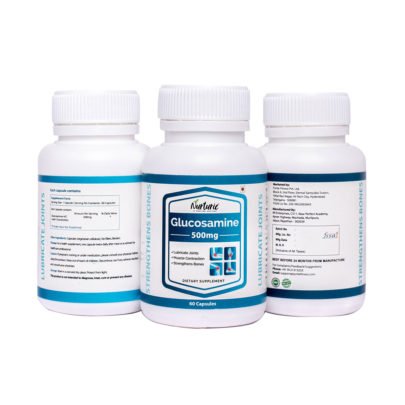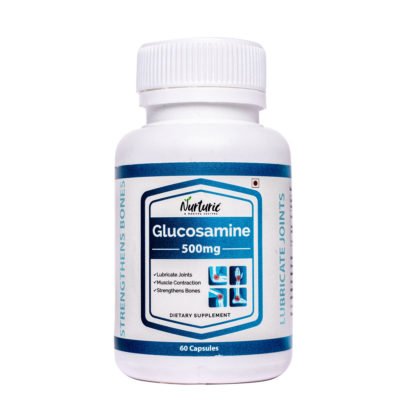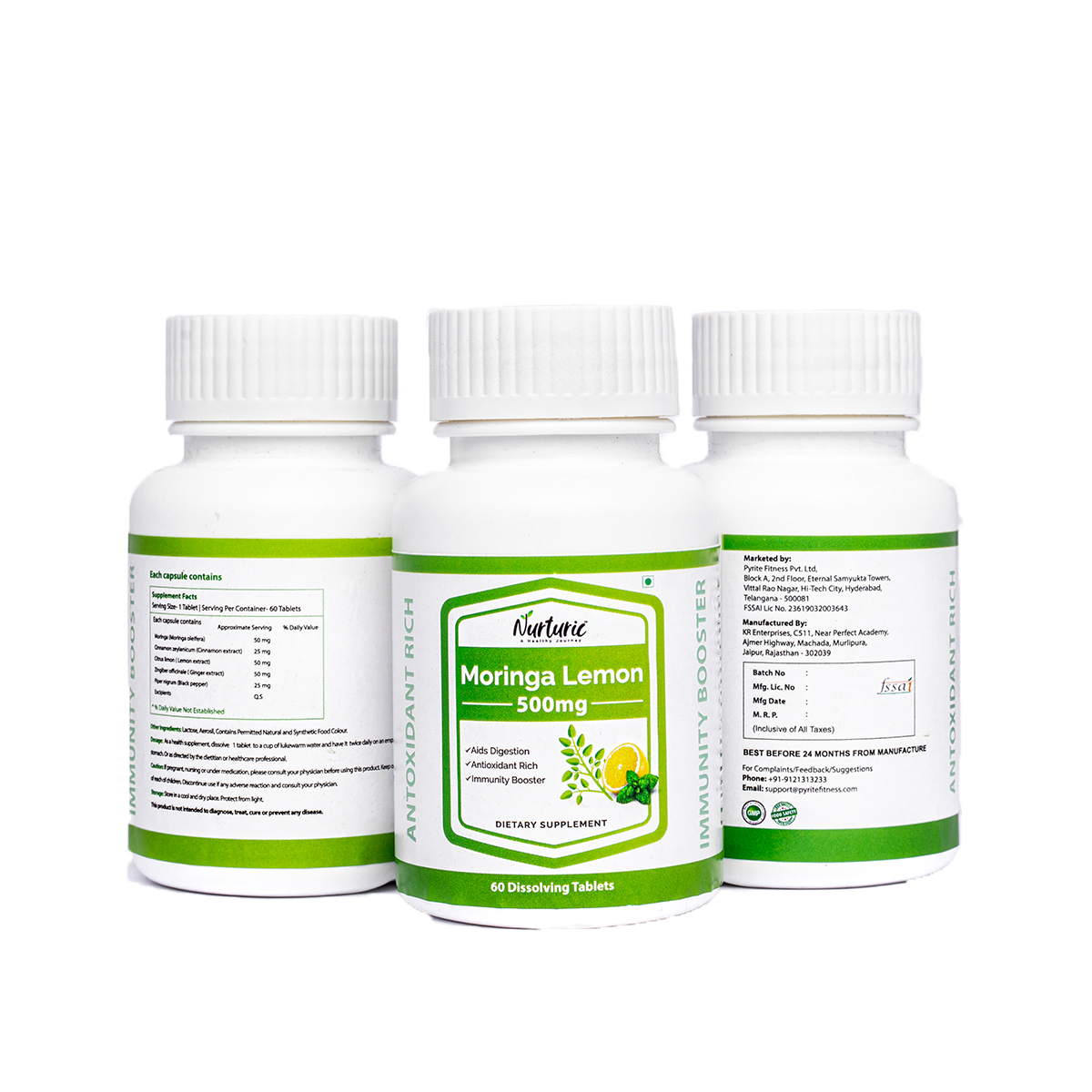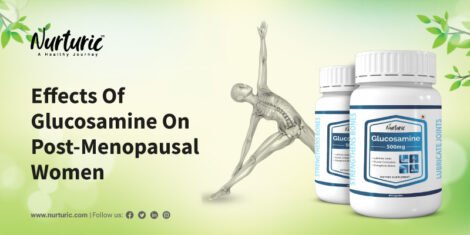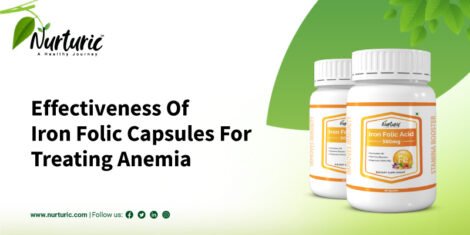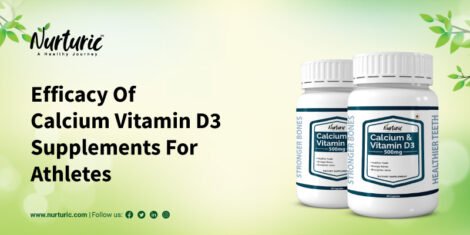- You have no items in your shopping cart
- Subtotal: ₹0.00
When we think of well-known supplement combinations, we usually think of calcium and vitamin D for joint health. With age, your joints may lose cartilage and lubricating fluid, resulting in pain and joint problems. Glucosamine is a supplement that has recently gained popularity for treating bone disorders. This supplement promotes cartilage health, reduces arthritis pain through an anti-inflammatory effect, aids in joint health restoration, increases mobility and improves joint lubrication.

Glucosamine is an amino sugar produced in cartilage, but it is usually consumed as a supplement. It is classified into two forms: glucosamine sulphate and glucosamine hydrochloride, which has glycosaminoglycans and glycoproteins, essential compounds used to construct joints such as ligaments, tendons, cartilage, and synovial fluid. It can help prevent osteoarthritis by slowing down damage and rebuilding cartilage. The body then incorporates glucosamine into cartilage, preventing breakdown, promoting repair, and aiding joint lubrication. The exoskeletons of crustaceans are a natural source of glucosamine to formulate dietary supplements. Let us delve deeper into the benefits of taking glucosamine.
Incredible Benefits Of Glucosamine Capsules
Glucosamine is a polysaccharide found in cartilaginous joint tissues that helps in protein and lipid synthesis. Skin, nails, bones and ligaments are among the other tissues that contain glucosamine. Synovial fluid contains glucosamine and fills the space between joints, aiding in reducing friction between joint surfaces.

Glucosamine is a naturally existing substance in the body responsible for forming muscles and tendons, cartilage and creamy fluid that surrounds our joints, acting as a cushion and aiding in the prevention of joint stiffness. The primary way glucosamine improves health is through its potent anti-inflammatory activity in the body. Let’s take a look at the number of potential health benefits that glucosamine may provide.
1. Reduces Inflammation
Glucosamine’s ability is to quell inflammation. It can alter the inflammatory processes in the body, reducing inflammation and, as a result, the prevalence and extent of disease development. It has cartilage-protecting properties, which reduce pain, especially in bone-related conditions like inflammation of the cells that produce bone tissue. It has the potential to slow joint cartilage deterioration, thereby reducing pain.
2. Supports Joint Health
The primary function of glucosamine is to aid in developing the tissues that exist between our joints. It accomplishes this by assisting in producing several chemicals involved in articular cartilage and synovial fluid formation. It may protect joint tissue by preventing cartilage breakdown and thinning. It helps to treat bone and joint problems like osteoarthritis, rheumatoid arthritis, and osteoporosis. Many people who suffer from bone pain, low bone density, or a history of fractures can benefit from glucosamine, which also aids in bone healing. It helps preserve the articular cartilage surrounding bones, reduces pain, and improves physical activities in people who have bone disorders or are at high risk of bone loss.
3. Stabilises Blood Sugar Levels
Glucosamine capsules lower blood sugar levels and even helps to keep diabetes under control. Those who have hypoglycemia should be aware of blood sugar changes caused by glucosamine. You should track your blood sugar levels regularly, or if you do it yourself at home, you should notify your doctor if you notice any changes. Glucosamine is a sugar that goes through some of the same metabolic pathways as glucose. It is processed by the Hexosamine Biosynthetic Pathway, which is involved in glucose transport and insulin resistance development, the primary cause of type 2 diabetes.
4. Lowers Risk Of Cardiovascular Disease
Glucosamine is a dietary supplement used to treat osteoarthritis and joint pain and help prevent cardiovascular disease and death. It has cardioprotective properties. It is cardioprotective and lowers C-reactive protein (CRP), a chemical associated with inflammation. It also benefits smokers, who have higher levels of inflammation and are at a higher risk of cardiovascular disease than nonsmokers. The inflammation is common in patients suffering from heart disease and stroke, and glucosamine plays a vital role in reducing inflammation and preventing cardiovascular disease.
5. Improves Bone Health
Glucosamine supplements may aid in the prevention of osteoporosis after menopause. It helps to reduce bone weakening by promoting healthy bone growth, and it is especially beneficial for people at risk of developing osteoporosis as they age. It helps some patients with knee, hip, and spine osteoarthritis relieve pain. Furthermore, it is an alternative source of NSAIDs for patients who require long-term treatment but cannot take NSAIDs. Glucosamine is an amino-saccharide that aids in the formation of cartilage from aggrecan and proteoglycan compounds. In addition, it lubricates and prevents the surrounding joints from being destroyed, reducing cartilage friction, allowing for natural and painless joint movement.
6. Activates Autophagy
Autophagy is a cellular housekeeping process in which worn or dysfunctional cellular components are scavenged and removed from the body. This cellular cleansing process is aided by glucosamine, which also stimulates and supports autophagy. This process becomes less effective with age, which contributes to the ageing process.
Now that you’ve learned about the glucosamine health benefits, let’s talk about why you need it and what conditions it can help prevent.
Who Needs It? What Conditions Can It Treat or Prevent?
Glucosamine, a naturally occurring substance found in cartilage, relieves joint stiffness and pain, protects the stomach and intestine lining, and reduces dark spots on the skin caused by sun exposure and ageing. It can help improve knee mobility in people who have had a sports injury and is an effective treatment for interstitial cystitis. Furthermore, it inhibits inflammatory cytokines, resulting in minor collagen breakdown. Because of its anti-inflammatory properties, glucosamine has numerous advantages that can help prevent the development of colorectal cancer. Let’s take a look at the conditions it can treat or prevent.
- Enhances tendon-to-bone healing
- Sports injuries
- Temporomandibular joint problems
- Chronic venous insufficiency
- Inflammation of the arteries
- Depression
- Emphysema
Although glucosamine has numerous benefits in treating joint disorders and cartilage degeneration disorders, it is essential to consult your certified nutritionist or physician before using it if you have other medical conditions or are undergoing treatment.

Now that we’ve seen the glucosamine supplement benefits and the conditions they can help prevent, let’s look at some natural glucosamine sources.
Natural Food Sources Of Glucosamine
Glucosamine is a naturally occurring component that contains several nutrients, including silicon and minerals. It is a natural amino sugar found in the fluid around joints and bones, bone marrow, shellfish, chicken, beef and some cheeses, where vegetarians and vegans will most likely struggle to get enough. It is usually extracted from the shells of shellfish or a synthetic source.

Glucosamine’s natural sources are limited and obtained from crustaceans, animal cartilage, bone marrow, cheese, and corn. Glucosamine is extracted from crustaceans’ outer shells or exoskeletons. Shells of edible crustaceans like shrimp, prawns, lobsters, crabs, krill, and crayfish are high in naturally occurring glucosamine. It is abundant in animal cartilages such as ears, snouts, and joint tissues. It can be consumed through stews, soups and sausages. Animal bone marrow is another good source of glucosamine. Because it is easily digestible and highly nutritious, bone broth has been used on an Ayurvedic diet. It contains anti-inflammatory properties similar to glucosamine, and it improves immune function and prevents digestive issues such as leaky gut syndrome.
Scroll down to know about the potential side effects and who should avoid taking them.
Possible Side Effects
Glucosamine has no significant side effects. People who are allergic to shellfish, crab, or shrimp should notify their doctor because glucosamine products are derived from them and may contain inactive ingredients that cause problems and other allergic reactions. If you are under other medications and are sensitive to others, these concerns should also be mentioned to the doctor before beginning the supplementation. Let us know about some of the adverse effects of excessive consumption.
- Drowsiness
- Skin reactions
- Headaches
- Puffy eyes
- Hair loss
- Irregular heart beating
- Swollen legs
These are some minor side effects that may occur in excess consumption. People with diabetes, phenylketonuria, liver disease, or other medical conditions should limit or avoid consuming glucosamine capsules. In that case, they must use caution while incorporating it into the diet.

Now that you’re aware of glucosamine tablets benefits and side effects. Let’s talk about how to choose the best supplement for joint health.
How to Choose the Right Supplement and Where to Buy It From
Many supplements and brands are available in the market, but many contain ingredients you are unaware of. The price may differ for both in the ready to consume and manipulated forms, depending on the mg per capsule. Check the label because some brands’ supplements are made from other components. Dosages in over-the-counter products may vary according to the potency of the source material. Follow the instructions and ingredients on the label or take as directed by a doctor.

Buy Nurturic Glucosamine Capsules, which are safe and plant-based, if you’re looking for a 100% organic supplement with no side effects. Many of our users have found relief from our natural joint supplement, and new research shows it can be used for other health concerns.
Our Take
If you have osteoarthritis, you should try glucosamine to relieve joint pain and slow the progression of the disease. Consult your certified naturopath to find out if glucosamine is a good option for you.
FAQs
1. Is it ok to take glucosamine every day?
Yes. Glucosamine is safe when consumed in recommended dosage.
2. What are the benefits of taking glucosamine?
Glucosamine is a dietary supplement that aids in the reduction of chronic inflammation, heart disease, diabetes and arthritis.
3. What are the side effects of glucosamine capsules?
When taken in moderation, glucosamine is both safe and well-tolerated. Nausea, heartburn, constipation, headache and bloating are all symptoms of excessive consumption.
4. What is the recommended dosage of glucosamine?
The recommended dosage of glucosamine supplements are 2-3 capsules a day after a meal.
5. Should I consume Glucosamine before or after eating?
Glucosamine capsules should be consumed orally. When taken after a meal, the salts in this medicine work well. It may cause a stomach upset if taken on an empty stomach
6. Is it safe for everyone to take glucosamine capsules?
Yes. Individuals over the age of 18 can use glucosamine in moderation.
7. What does glucosamine do for the skin?
Glucosamine contains hyaluronic acid, which promotes wound healing, increases skin hydration and reduces wrinkles. Moreover, it inhibits melanin production and treats hyperpigmentation.
8. How long should you consume glucosamine?
It is recommended to consume it for two to four months to reap its benefits.
9. What foods are high in glucosamine?
Glucosamine is a natural sugar found in the fluid around joints, animal bones, bone marrow, shellfish and fungi.
10. When is the most appropriate time to take glucosamine?
It is recommended to take glucosamine capsules with meals to support digestive health.



